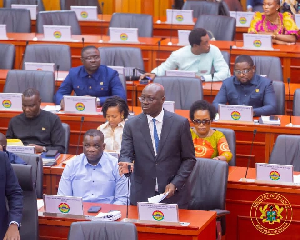The Governor of the Bank of Ghana, Dr. Ernest Addison, says the Finance Ministry’s treatment of the cost of the financial sector clean-up and energy sector payments as exceptional expenditure—hence their exclusion from the computation of the fiscal deficit—should be reconsidered from now on.
Dr. Addison, speaking at Monday’s Monetary Policy Committee press briefing in Accra, suggested that the practice, introduced two years ago under the International Monetary Fund (IMF) programme, has outlived its usefulness.
“In 2018, when we were under an IMF programme, in order to be able to monitor the budget performance, it was important that we computed the deficit to exclude the energy and financial sectors, as those were legacy problems that we had inherited.
Now that we have finished the programme, given the developments in 2020 in the wake of the pandemic, this is the time to relook at that area—the broader fiscal deficit which includes the energy and the financial sector issues.
Over the medium term, we need to redefine the broader fiscal deficit, which gives you a better sense of the burden on the budget,” the governor explained.
In October, Finance Minister Ken Ofori-Atta said the financial sector bailout has cost the government GH¢21.6bn since 2018, an amount which is expected to go up given the release of fresh funds to pay investors of failed fund management companies.
Although the 2020 fiscal deficit is officially projected at 11.4 percent of GDP, the inclusion of additional financial sector expenses incurred during the year is likely to increase the gap to more than 13 percent of GDP.
Nevertheless, the central bank governor said he expects the Finance Ministry to cut the deficit to 5 percent of GDP by 2024, in compliance with the Fiscal Responsibility Act.
“The type of shock that we had in 2020 is not something that will easily be corrected. We think that we probably will revert to the fiscal rule in three years. We expect that in 2021, the budget deficit should be around 8.8 percent [of GDP]; [in] 2022, we see a further decline. It’s a gradual adjustment to where we want to be.”
Unchanged rate
The MPC, in what was its last meeting for the year, kept the policy rate unchanged at 14.5 percent. The governor explained that the pandemic has increased the financing needs of government, and a rate reduction will be a disincentive for investors seeking to buy government bonds.
Dr. Addison, who chairs the MPC, noted that the expansionary fiscal stance to address the COVID-19 pandemic has led to deviation from the path of fiscal consolidation.
“Looking ahead to 2021, a decisive fiscal correction plan would be needed to contain fiscal risks in the medium term,” the governor said.
Business News of Wednesday, 25 November 2020
Source: thebusiness24online.net













